- Home
- Charles de Lint
The Very Best of Charles De Lint Page 8
The Very Best of Charles De Lint Read online
Page 8
It was a short walk up Battersfield Road to where Kathryn’s was nestled in the heart of Lower Crowsea. Like the area itself, with its narrow streets and old stone buildings, the café had an old world feel about it—from the dark wood paneling and hand-carved chair backs to the small round tables, with checkered tablecloths, fat glass condiment containers and straw-wrapped wine bottles used as candleholders. The music piped in over the house sound system was mostly along the lines of Telemann and Vivaldi, Kitaro and old Bob James albums. The waitresses wore cream-coloured pinafores over flowerprint dresses.
But if the atmosphere was old world, the clientele were definitely contemporary. Situated so close to Butler U., Kathryn’s had been a favourite haunt of the university’s students since it first opened its doors in the mid-sixties as a coffeehouse. Though much had changed from those early days, there was still music played on its small stage on Friday and Saturday nights, as well as poetry recitations on Wednesdays, and Sunday morning storytelling sessions.
Jilly and Meran sat by a window, coffee and homemade banana muffins set out on the table in front of them.
“Whatever were you doing down there anyway?” Meran asked. “It’s not exactly the safest place to be wandering about.”
Jilly nodded. The skells in Old City weren’t all thin and wasted. Some were big and mean-looking, capable of anything—not really the sort of people Jilly should be around, because if something went wrong…well, she was the kind of woman for whom the word petite had been coined. She was small and slender—her tiny size only accentuated by the oversized clothing she tended to wear. Her brown hair was a thick tangle, her eyes the electric blue of sapphires. She was too pretty and too small to be wandering about in places like Old City on her own.
“You know the band, No Nuns Here?” Jilly asked.
Meran nodded.
“I’m doing the cover painting for their first album,” Jilly explained. “They wanted something moody for the background—sort of like the Tombs, but darker and grimmer—and I thought Old City would be the perfect place to get some reference shots.”
“But to go there on your own…”
Jilly just shrugged. She was known to wander anywhere and everywhere, at any time of the night or day, camera or sketchbook in hand, often both.
Meran shook her head. Like most of Jilly’s friends, she’d long since given up trying to point out the dangers of carrying on the way Jilly did.
“So you found this drum,” she said.
Jilly nodded. She looked down at the little scab on the palm of her hand. It itched like crazy, but she was determined not to open it again by scratching it.
“And now you want to…?”
Jilly looked up. “Take it back. Only I’m scared to go there on my own. I thought maybe Cerin would come with me—for moral support, you know?”
“He’s out of town,” Meran said.
Meran and her husband made up the two halves of the Kelledys, a local traditional music duo that played coffeehouses, festivals and colleges from one coast to the other. For years now, however, Newford had been their home base.
“He’s teaching another of those harp workshops,” Meran added.
Jilly did her best to hide her disappointment.
What she’d told Meran about “moral support” was only partly the reason she’d wanted their help because, more so than either Christy’s stories, or Bramley’s askewed theories, the Kelledys were the closest thing to real magic that she could think of in Newford. There was an otherwordly air about the two of them that went beyond the glamour that seemed to always gather around people who became successful in their creative endeavours.
It wasn’t something Jilly could put her finger on. It wasn’t as though they went on and on about this sort of thing at the drop of a hat the way that Bramley did. Nor that they were responsible for anything more mysterious than the enchantment they awoke on stage when they were playing their instruments. It was just there. Something that gave the impression that they were aware of what lay beyond the here and now. That they could see things others couldn’t; knew things that remained secret to anyone else.
Nobody even knew where they had come from; they’d just arrived in Newford a few years ago, speaking with accents that had rapidly vanished, and here they’d pretty well stayed ever since. Jilly had always privately supposed that if there was a place called Faerie, then that was from where they’d come, so when she woke up this morning, deciding she needed magical help, she’d gone looking for one or the other and found Meran. But now…
“Oh,” she said.
Meran smiled.
“But that doesn’t mean I can’t try to help,” she said.
Jilly sighed. Help with what? she had to ask herself. The more she thought about it, the sillier it all seemed. Skookin. Right. Maybe they held debating contests with Christy’s mutant rats.
“I think maybe I’m nuts,” she said finally. “I mean, goblins living under the city…?”
“I believe in the little people,” Meran said. “We called them bodachs where I come from.”
Jilly just looked at her.
“But you laughed when I talked about them,” she said finally.
“I know—and I shouldn’t have. It’s just that whenever I hear that name that Christy’s given them, I can’t help myself. It’s so silly.”
“What I saw last night didn’t feel silly,” Jilly said.
If she’d actually seen anything. By this point—even with Meran’s apparent belief—she wasn’t sure what to think anymore.
“No,” Meran said. “I suppose not. But—you’re taking the drum back, so why are you so nervous?”
“The man in Christy’s story returned the apple he stole,” Jilly said, “and you know what happened to him….”
“That’s true,” Meran said, frowning.
“I thought maybe Cerin could…” Jilly’s voice trailed off.
A small smile touched Meran’s lips. “Could do what?”
“Well, this is going to sound even sillier,” Jilly admitted, “but I’ve always pictured him as sort of a wizard type.”
Meran laughed. “He’d love to hear that. And what about me? Have I acquired wizardly status as well?”
“Not exactly. You always struck me as being an earth spirit—like you stepped out of an oak tree or something.” Jilly blushed, feeling as though she was making even more of a fool of herself than ever, but now that she’d started, she felt she had to finish. “It’s sort of like he learned magic, while you just are magic.”
She glanced at her companion, looking for laughter, but Meran was regarding her gravely. And she did look like a dryad, Jilly thought, what with the green streaks in the long, nut-brown ringlets of her hair and her fey sort of Pre-Raphaelite beauty. Her eyes seemed to provide their own light, rather than take it in.
“Maybe I did step out of a tree one day,” Meran said.
Jilly could feel her mouth forming a surprised “O,” but then Meran laughed again.
“But probably I didn’t,” she said. Before Jilly could ask her about that “probably,” Meran went on. “We’ll need some sort of protection against them.”
Jilly made her mind shift gears, from Meran’s origins to the problem at hand.
“Like holy water or a cross?” she asked.
Her head filled with the plots of a hundred bad horror films, each of them clamoring for attention.
“No,” Meran said. “Religious artifacts and trappings require faith—a belief in their potency that the skookin undoubtedly don’t have. The only thing I know for certain that they can’t abide is the truth.”
“The truth?”
Meran nodded. “Tell them the truth—even it’s only historical facts and trivia—and they’ll shun you as though you were carrying a plague.”
“But what about after?” Jilly said. “After we’ve delivered the drum and they come looking for me? Do I have to walk around carrying a cassette machine spouting dates and facts for t
he rest of my life?”
“I hope not.”
“But…”
“Patience,” Meran replied. “Let me think about it for a while.”
Jilly sighed. She regarded her companion curiously as Meran took a sip of her coffee.
“You really believe in this stuff, don’t you?” she said finally.
“Don’t you?”
Jilly had to think about that for a moment.
“Last night I was scared,” she said, “and I’m returning the drum because I’d rather be safe than sorry, but I’m still not sure.”
Meran nodded understandingly, but, “Your coffee’s getting cold,” was all she had to say.
* * *
Meran let Jilly stay with her that night in the rambling old house where she and Cerin lived. Straddling the border between Lower Crowsea and Chinatown, it was a tall, gabled building surrounded by giant oak trees. There was a rounded tower in the front, to the right of a long screen-enclosed porch, stables around the back and a garden along the west side of the house that seemed to have been plucked straight from a postcard of the English countryside.
Jilly loved this area. The Kelledys’ house was the easternmost of the stately estates that stood, row on row, along McKennit Street, between Lee and Yoors. Whenever Jilly walked along this part of McKennit, late at night when the streetcars were tucked away in their downtown station and there was next to no other traffic, she found it easy to imagine that the years had wound back to a bygone age when time moved at a different pace, when Newford’s streets were cobblestoned and the vehicles that traversed them were horse-drawn, rather than horse-powered.
“You’ll wear a hole in the glass if you keep staring through it so intently.”
Jilly started. She turned long enough to acknowledge her hostess’s presence, then her gaze was dragged back to the window, to the shadows cast by the oaks as twilight stretched them across the lawn, to the long low wall that bordered the lawn, to the street beyond.
Still no skookin. Did that mean they didn’t exist, or that they hadn’t come out yet? Or maybe they just hadn’t tracked her here to the Kelledys’ house. She started again as Meran laid a hand on her shoulder and gently turned her from the window.
“Who knows what you’ll call to us, staring so,” Meran said.
Her voice held the same light tone as it had when she’d made her earlier comment, but this time a certain sense of caution lay behind the words.
“If they come, I want to see them,” Jilly said.
Meran nodded. “I understand. But remember this: the night’s a magical time. The moon rules her hours, not the sun.”
“What does that mean?”
“The moon likes secrets,” Meran said. “And secret things. She lets mysteries bleed into her shadows and leaves us to ask whether they originated from otherworlds, or from our own imaginations.”
“You’re beginning to sound like Bramley,” Jilly said. “Or Christy.”
“Remember your Shakespeare,” Meran said. “‘This fellow’s wise enough to play the fool.’ Did you ever think that perhaps their studied eccentricity protects them from sharper ridicule?”
“You mean all those things Christy writes about are true?”
“I didn’t say that.”
Jilly shook her head. “No. But you’re talking in riddles just like a wizard out of some fairy tale. I never understood why they couldn’t talk plainly.”
“That’s because some things can only be approached from the side. Secretively. Peripherally.”
Whatever Jilly was about to say next, died stillborn. She pointed out the window to where the lawn was almost swallowed by shadows.
“Do…” She swallowed thickly, then tried again. “Do you see them?”
They were out there, flitting between the wall that bordered the Kelledys’ property and those tall oaks that stood closer to the house. Shadow shapes. Fat, pumpkin-bodied and twig-limbed. There were more of them than there’d been last night. And they were bolder. Creeping right up towards the house. Threats burning in their candle-flicker eyes. Wide mouths open in Jack o’ Lantern grins, revealing rows of pointed teeth.
One came sidling right up the window, its face monstrous at such close proximity. Jilly couldn’t move, couldn’t even breathe. She remembered what Meran had said earlier—
They can’t abide the truth
—but she couldn’t frame a sentence, never mind a word, and her mind was filled with only a wild unreasoning panic. The creature reached out a hand towards the glass, clawed fingers extended. Jilly could feel a scream building up, deep inside her. In a moment that hand would come crashing through the window, shattering glass, clawing at her throat. And she couldn’t move. All she could do was stare, stare as the claws reached for the glass, stare as it drew back to—
Something fell between the creature and the house—a swooping, shapeless thing. The creature danced back, saw that it was only the bough of one of the oak trees and was about to begin its approach once more, but the cries of its companions distracted it. Not until it turned its horrible gaze from her, did Jilly feel able to lift her own head.
She stared at the oaks. A sudden wind had sprung up, lashing the boughs about so that the tall trees appeared to be giants, flailing about their many-limbed arms like monstrous, agitated octopi. The creatures in the yard scattered and in moments they were gone—each and every one of them. The wind died down; the animated giants became just oak trees once more.
Jilly turned slowly from the window to find Meran pressed close beside her.
“Ugly, furtive and sullen,” Meran said. “Perhaps Christy wasn’t so far off in naming them.”
“They…they’re real, aren’t they?” Jilly asked in a small voice.
Meran nodded. “And not at all like the bodachs of my homeland. Bodachs are mischievous and prone to trouble, but not like this. Those creatures were weaned on malevolence.”
Jilly leaned weakly against the windowsill.
“What are we going to do?” she asked.
She scratched at her palm—the itch was worse than ever. Meran caught her hand, pulled it away. There was an unhappy look in her eyes when she lifted her gaze from the mark on Jilly’s palm.
“Where did you get that?” she asked.
Jilly looked down at her palm. The scab was gone, but the skin was all dark around the puncture wound now—an ugly black discolouration that was twice the size of the original scab.
“I scratched myself,” she said. “Down in Old City.”
Meran shook her head. “No,” she said. “They’ve marked you.”
Jilly suddenly felt weak. Skookin were real. Mysterious winds rose to animate trees. And now she was marked?
She wasn’t even sure what that meant, but she didn’t like the sound of it. Not for a moment.
Her gaze went to the stone drum where it stood on Meran’s mantel. She didn’t think she’d ever hated an inanimate object so much before.
“Marked…me…?” she asked.
“I’ve heard of this before,” Meran said, her voice apologetic. She touched the mark on Jilly’s palm. “This is like a…bounty.”
“They really want to kill me, don’t they?”
Jilly was surprised that her voice sounded as calm as it did. Inside she felt as though she was crumbling to little bits all over the place.
“Skookin are real,” she went on, “and they’re going to tear me up into little pieces—just like they did to the man in Christy’s stupid story.”
Meran gave her a sympathetic look.
“We have to go now,” she said. “We have to go and confront them now, before…”
“Before what?”
Jilly’s control over her voice was slipping. Her last word went shrieking up in pitch.
“Before they send something worse,” Meran said.
Oh great, Jilly thought, as she waited for Meran to change into clothing more suitable for the underground trek to Old City. Not only were skookin real, but th
ere were worse things than those pumpkinhead creatures living down there under the city.
She slouched in one of the chairs by the mantelpiece, her back to the stone drum, and pretended that her nerves weren’t all scraped raw, that she was just over visiting a friend for the evening and everything was just peachy, thank you. Surprisingly, by the time Meran returned, wearing jeans, sturdy walking shoes and a thick woolen shirt under a denim jacket, she did feel better.
“The bit with the trees,” she asked as she rose from her chair. “Did you do that?”
Meran shook her head.
“But the wind likes me,” she said. “Maybe it’s because I play the flute.”
And maybe it’s because you’re a dryad, Jilly thought, and the wind’s got a thing about oak trees, but she let the thought go unspoken.
Meran fetched the long, narrow bag that held her flute and slung it over her shoulder.
“Ready?” she asked.
“No,” Jilly said.
But she went and took the drum from the mantelpiece and joined Meran by the front door. Meran stuck a flashlight in the pocket of her jacket and handed another to Jilly, who thrust it into the pocket of the coat Meran was lending her. It was at least two sizes too big for her, which suited Jilly just fine.
Naturally, just to make the night complete, it started to rain before they got halfway down the walk to McKennit Street.
* * *
For safety’s sake, city work crews had sealed up all the entrances to Old City in the mid-seventies—all the entrances of which the city was aware, at any rate. The street people of Newford’s back lanes and alleys knew of anywhere from a half-dozen to twenty others that could still be used, the number depending only on who was doing the bragging. The entrance to which Jilly led Meran was the most commonly known and used—a steel maintenance door situated two hundred yards or so down the east tracks of the Grasso Street subway station.
The door led into the city’s sewer maintenance tunnels, but had long since been abandoned. Skells had broken the locking mechanism and the door stood continually ajar. Inside, time and weathering had worn down a connecting wall between the maintenance tunnels and what had once been the top floor of one of Old City’s proud skyscrapers—an office complex that had towered some four stories above the city’s streets before the quake dropped it into its present subterranean setting.

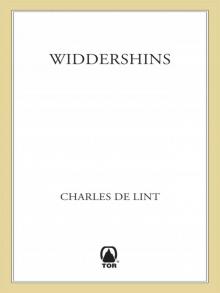 Widdershins
Widdershins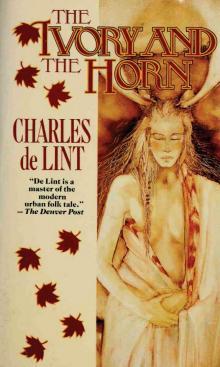 The Ivory and the Horn
The Ivory and the Horn Yarrow
Yarrow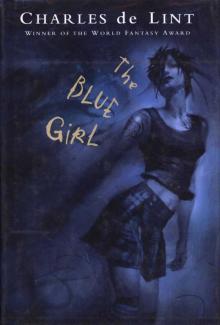 The Blue Girl
The Blue Girl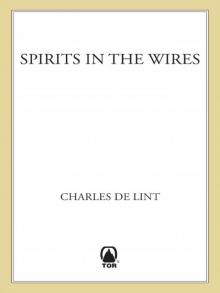 Spirits in the Wires
Spirits in the Wires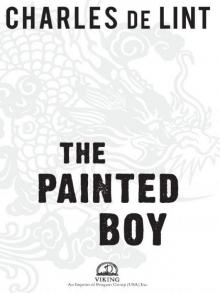 The Painted Boy
The Painted Boy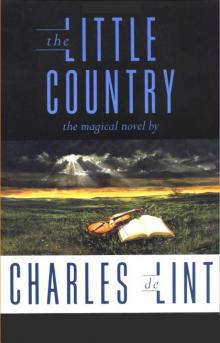 The Little Country
The Little Country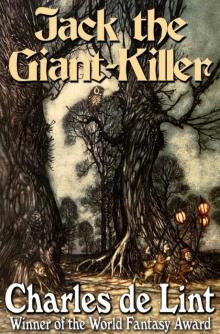 Jack of Kinrowan: Jack the Giant-Killer / Drink Down the Moon
Jack of Kinrowan: Jack the Giant-Killer / Drink Down the Moon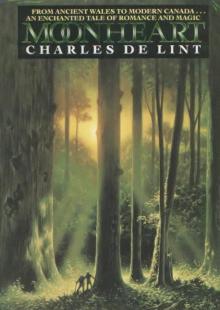 Moonheart
Moonheart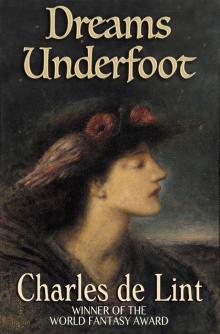 Dreams Underfoot
Dreams Underfoot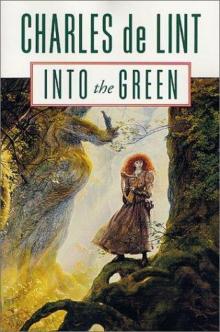 Into the Green
Into the Green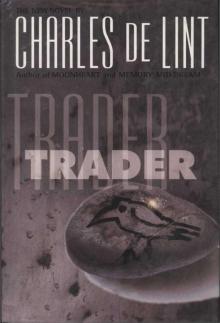 Trader
Trader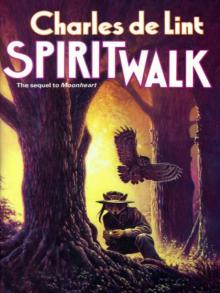 Spiritwalk
Spiritwalk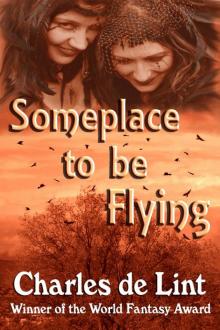 Someplace to Be Flying
Someplace to Be Flying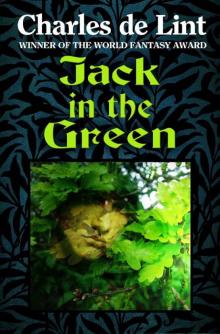 Jack in the Green
Jack in the Green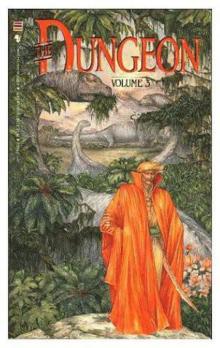 The Valley of Thunder
The Valley of Thunder Out of This World
Out of This World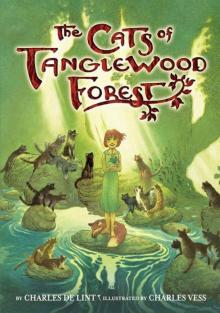 The Cats of Tanglewood Forest
The Cats of Tanglewood Forest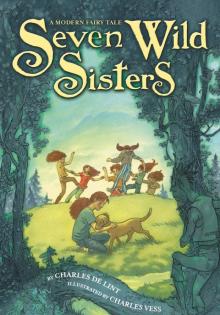 Seven Wild Sisters
Seven Wild Sisters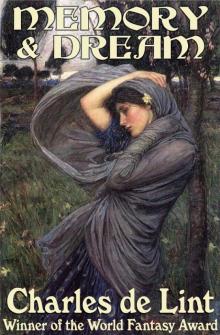 Memory and Dream
Memory and Dream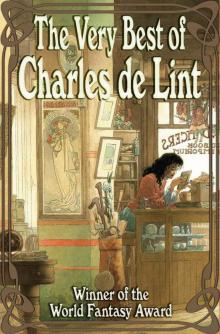 The Very Best of Charles De Lint
The Very Best of Charles De Lint Under My Skin
Under My Skin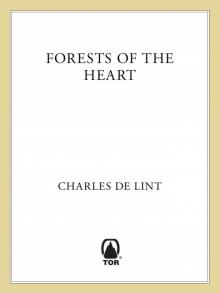 Forests of the Heart
Forests of the Heart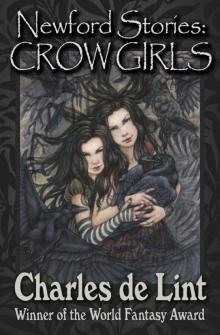 The Newford Stories
The Newford Stories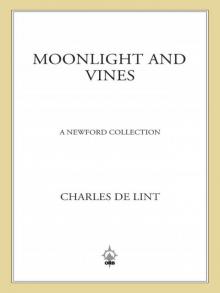 Moonlight and Vines
Moonlight and Vines Angel of Darkness
Angel of Darkness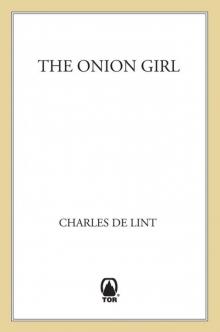 The Onion Girl
The Onion Girl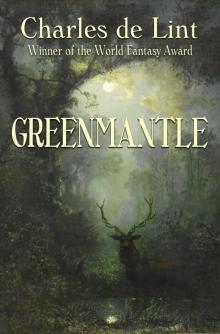 Greenmantle
Greenmantle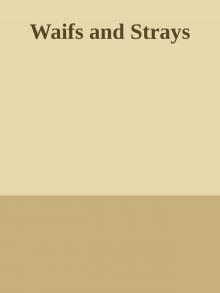 Waifs And Strays
Waifs And Strays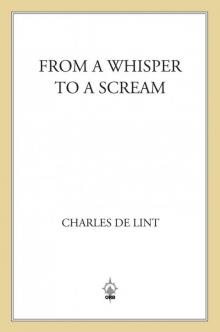 From a Whisper to a Scream
From a Whisper to a Scream Over My Head
Over My Head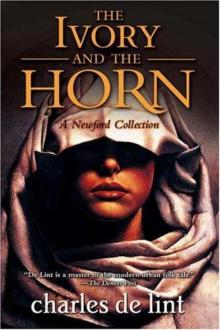 The Ivory and the Horn n-6
The Ivory and the Horn n-6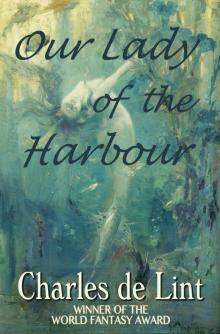 Our Lady of the Harbour
Our Lady of the Harbour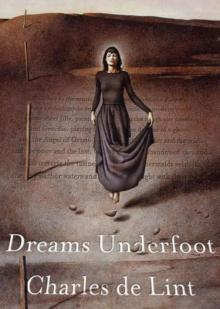 Dreams Underfoot n-1
Dreams Underfoot n-1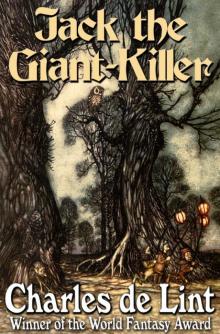 Jack the Giant-Killer (Jack of Kinrowan Book 1)
Jack the Giant-Killer (Jack of Kinrowan Book 1)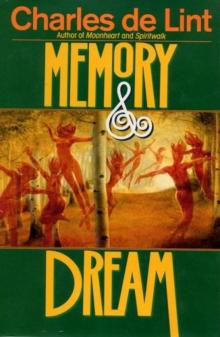 Memory and Dream n-5
Memory and Dream n-5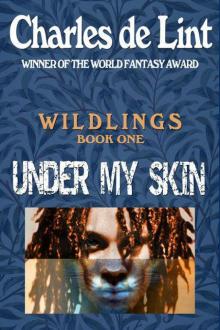 Under My Skin (Wildlings)
Under My Skin (Wildlings)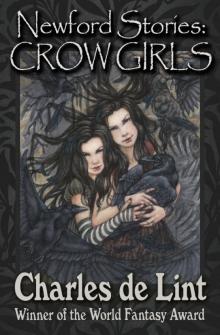 Newford Stories
Newford Stories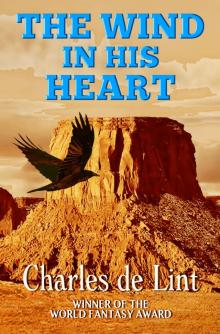 The Wind in His Heart
The Wind in His Heart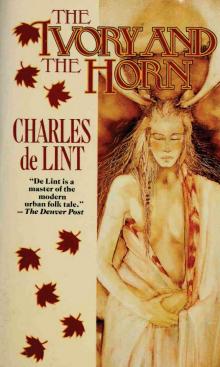 Ivory and the Horn
Ivory and the Horn